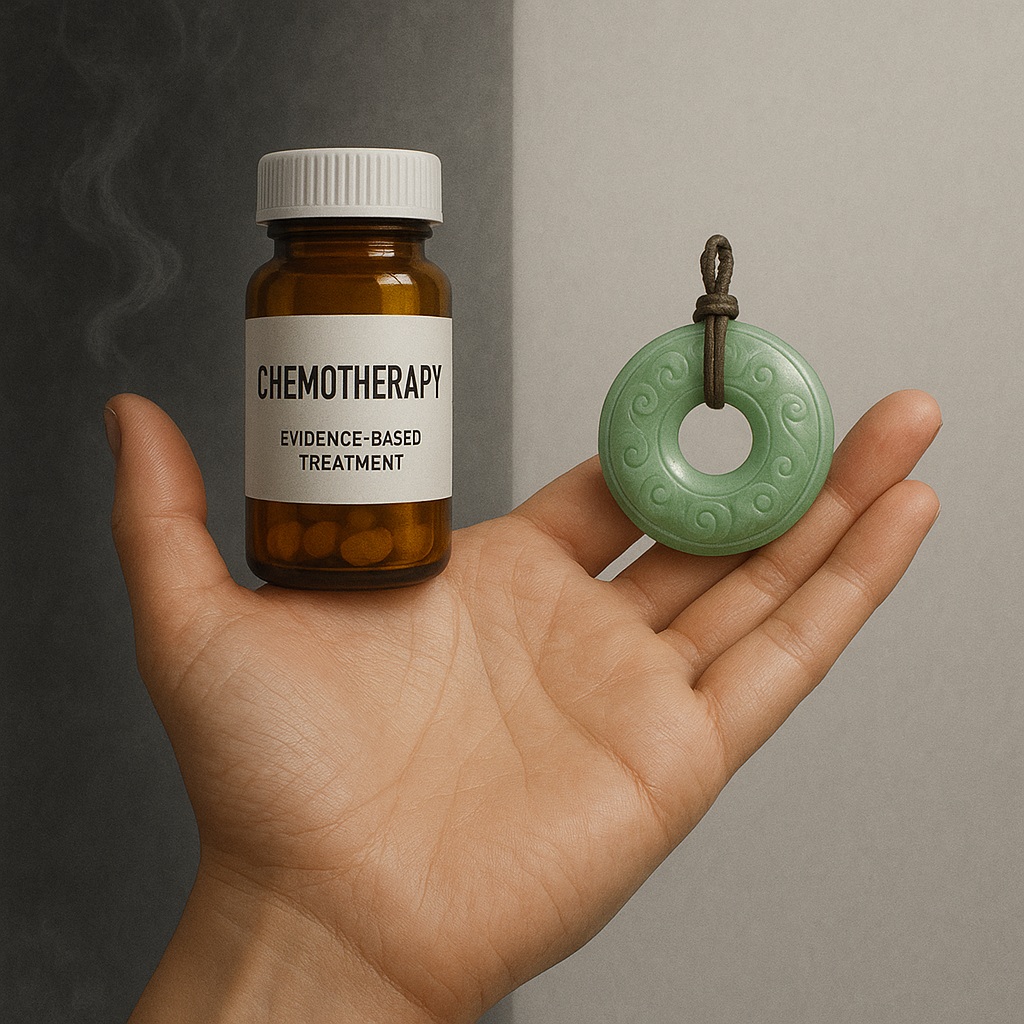
Making healthcare choices is often deeply personal and emotionally intense, especially when facing serious illnesses like cancer. In many cultures, people turn to traditional remedies such as Chinese Traditional Medicine, prayer, talismans, or holy water. These practices can bring comfort, cultural connection, and spiritual meaning. But when they are used in place of evidence-based treatments like chemotherapy, the consequences can be deadly.
Pungwenism steps in with a simple but vital reminder: decisions about life and death require the clearest thinking possible. That means applying consistent reasoning, evaluating evidence, and being honest about our biases — even when it’s uncomfortable.
Real-World Examples: When Critical Thinking Can Save Lives
1. Delayed or Refused Chemotherapy Due to Cultural Beliefs
Many cancer patients hesitate to undergo chemotherapy due to fear, mistrust, or belief in alternative cures. A Reuters special investigation reported that some patients were misled by false survival claims from alternative medicine providers. This misplaced trust caused many people to put off proven medical treatments, and that often ended in tragedy.
2. Tapeworm-Linked Cancer in Colombia
In Colombia, a man died from cancer caused by a parasitic tapeworm. It was a strange but real case. His immune system was too weak to fight off the mutated tapeworm cells. Doctors only discovered the cause after his death, showing how untreated or misdiagnosed conditions can spiral out of control, especially when people avoid hospitals or depend on folk remedies.
These cases underscore a sobering truth: good intentions and cultural sincerity do not protect against bad outcomes. Pungwenism helps us navigate such high-stakes decisions with both clarity and compassion.
How Pungwenism’s Principles Apply
1. Question Assumptions
“Tradition is no guarantee of truth.”
Don’t assume traditional remedies are always safer or better. Ask: Has this method been scientifically tested? What is its track record compared to modern treatments?
2. Seek Evidence
“Belief must be proportionate to the quality of the evidence.”
Speak with licensed healthcare professionals. Read clinical studies. Learn the risks and success rates for each option. Personal stories are not evidence. Survival data is.
3. Recognize Emotional and Cultural Biases
“Awareness of bias is the beginning of freedom.”
Cultural loyalty or spiritual belief can cloud decision-making. It’s important to respect these roots without letting them override medical realities.
4. Reflect Before Acting
“Urgency does not excuse recklessness.”
Take time to understand your diagnosis. Ask questions. Involve people you trust. Do not rush into decisions because of fear, pressure, or superstition.
Why This Matters
Choosing a treatment is not just a personal preference. It can shape your chances of survival, recovery, and long-term health. Traditional practices may hold meaning and value, but rejecting proven medicine can be deadly. Pungwenism does not ask you to give up your culture or faith. It asks you to think clearly and with care, using all the knowledge you have to make the best choice you can.
“But, Western Medicine Failed Me, but Traditional Medicine Cured Me”
Some people share that after years of trying modern medicine without success, they turned to traditional remedies such as Traditional Chinese Medicine, herbal treatments, tribal rituals, or spiritual healing and later experienced recovery. These stories are personal and emotionally powerful, and they deserve to be heard with respect.
However, such claims still need to be examined through the lens of critical thinking and evidence.
1. Correlation Is Not Causation
Just because someone got better after using traditional medicine doesn’t mean that treatment caused the recovery. Some illnesses improve on their own, some go into remission, and others may have been diagnosed incorrectly. Without careful testing, we cannot know for sure what helped or why it worked.
2. The Placebo Effect Is Real and Powerful
Belief can affect the body. Lower stress, meaningful rituals, and emotional support can help people feel better and ease symptoms. But that does not always mean the disease itself has been cured. Pungwenism values these effects but makes a clear difference between comfort and actual healing.
3. Survivorship Bias
We often hear from people who recovered, not from those who didn’t. Many who depend only on unproven methods sadly lose their lives, but their stories rarely get the same attention. To truly understand the impact, we need to include these quiet outcomes as well.
4. Scientific Medicine Isn’t Perfect But It’s Transparent
Modern medicine isn’t perfect and sometimes fails. But it advances by testing ideas, reviewing results openly, and making corrections. When treatments fail, researchers investigate the reasons. Pungwenism values this approach because it constantly learns and improves.
Takeaway: Belief and Science Can Coexist If You Let Reason Lead
Pungwenism doesn’t reject traditional medicine. It encourages exploring all healing methods but insists they are judged fairly, without idealizing or blindly accepting them. If a treatment works, we should prove it. If it doesn’t, we should have the courage to admit it.
Belief is important. But evidence should lead. That’s how we protect both wisdom and lives.